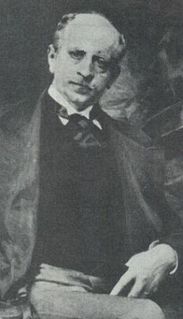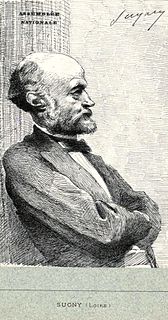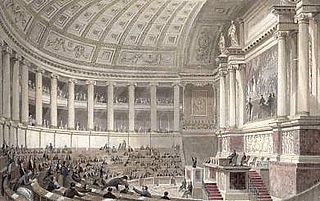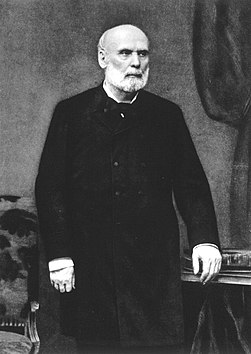
Patrice de MacMahon, 6th Marquess of MacMahon, 1st Duke of Magenta, was a French general and politician, with the distinction of Marshal of France. He served as Chief of State of France from 1873 to 1875 and as the second President of the French Third Republic, from 1875 to 1879.

The National Congress of Brazil is the legislative body of Brazil's federal government. Unlike the state Legislative Assemblies and Municipal Chambers, the Congress is bicameral, composed of the Federal Senate and the Chamber of Deputies. The Congress meets annually in Brasília, from 2 February to 27 July and from 1 August to 22 December.

Auguste Louis Albéric, Prince of Arenberg was a French noble and monarchist politician, born in Paris. Third son of Pierre d'Alcantara Charles Marie, duc d'Arenberg and Alix de Talleyrand-Périgord, he inherited his father's title because of his older brothers' premature deaths.

Elections in Rwanda take place within the framework of a multi-party democracy and a presidential system. The President and majority of members of the Chamber of Deputies are directly elected, whilst the Senate is indirectly elected and partly appointed.

The Electoral Commission was a temporary body created on January 29, 1877 by the United States Congress to resolve the disputed United States presidential election of 1876. Democrat Samuel J. Tilden and Republican Rutherford B. Hayes were the main contenders in the election. Tilden won 184 electoral votes—one vote shy of the 185 needed to win—to Hayes's 165, with 20 electoral votes from four states unresolved. Both Tilden and Hayes electors submitted votes from these states; and each claimed victory over the other.

The Chamber of Deputies is a federal legislative body and the lower house of the National Congress of Brazil. The chamber comprises 513 deputies, who are elected by proportional representation to serve four-year terms. The current President of the Chamber is the deputy Rodrigo Maia (DEM-RJ), who was elected in July 14, 2016 to serve for the remainder of the 2015–2016 term.

The Forty-fourth United States Congress was a meeting of the legislative branch of the United States federal government, consisting of the United States Senate and the United States House of Representatives. It met in Washington, D.C. from March 4, 1875, to March 4, 1877, during the seventh and eighth years of Ulysses S. Grant's presidency. The apportionment of seats in the House of Representatives was based on the Ninth Census of the United States in 1870. For the first time since the American Civil War, the House had a Democratic majority. The Senate maintained a Republican majority.

The Forty-fifth United States Congress was a meeting of the legislative branch of the United States federal government, consisting of the United States Senate and the United States House of Representatives. It met in Washington, D.C. from March 4, 1877, to March 4, 1879, during the first two years of Rutherford Hayes's presidency. The apportionment of seats in the House of Representatives was based on the Ninth Census of the United States in 1870. The Senate had a Republican majority, and the House had a Democratic majority.
The 16 May 1877 crisis was a constitutional crisis in the French Third Republic concerning the distribution of power between the President and the legislature. When the royalist President Patrice MacMahon dismissed the Opportunist Republican Prime Minister Jules Simon, the parliament on 16 May 1877 refused to support the new government and was dissolved by the President. New elections resulted in the royalists increasing their seat totals, but nonetheless resulted in a majority for the Republicans. Thus, the interpretation of the 1875 Constitution as a parliamentary system prevailed over a presidential system. The crisis ultimately sealed the defeat of the royalist movement, and was instrumental in creating the conditions of the longevity of the Third Republic.

The Iowa Senate is the upper house of the Iowa General Assembly, United States. There are 50 seats in the Iowa Senate, representing 50 single-member districts across the state of Iowa with populations of approximately 60,927 per constituency, as of the 2010 United States Census. Each Senate district is composed of two House districts. The Senate meets at the Iowa State Capitol in Des Moines.

The 1876 general election to the Chamber of Deputies, the lower chamber of the National Assembly of the French Third Republic under the French Constitutional Laws of 1875, was held on 20 February and 5 March 1876.
The Moderates or Moderate Republicans, pejoratively labeled Opportunist Republicans, were a French political group active in the late 19th century during the Third French Republic. The leaders of the group included Jules Ferry, Jules Grévy, Henri Wallon and René Waldeck-Rousseau.
The United States Senate elections of 1876 and 1877 had the Democratic Party gain five seats in the United States Senate, and coincided with Rutherford B. Hayes's narrow election as President. Republicans remained in the majority, however.
The United States Senate elections of 1878 and 1879 were elections which had the Democratic Party retake control of the United States Senate for the first time since before the Civil War.
The 2010 Brazilian legislative election was held on Sunday, October 3, as part of the country's general election. On that date, 54 of the 81 seats in the Federal Senate and all 513 seats in the Chamber of Deputies were up for election.
The Chamber of Deputies of the Ottoman Empire was the lower house of the General Assembly, the Ottoman Parliament. Unlike to the upper house, the Senate, the members of the Chamber of Deputies were elected by the general Ottoman populace, although suffrage was limited to males of a certain financial standing, among other restrictions that varied over the Chamber's lifetime.

Marie, François, Oscar Bardi de Fourtou was a French politician. Born into a bourgeois family, he served as Minister of Transport from 7 December 1872 – 18 May 1873. He also served as Minister of Interior and Minister of Public Instruction, in which he "carried out aggressively conservative policies by dismissing certain liberal professors and re-establishing censorship."

Francisque-Marie-Joseph Ramey, the Count of Sugny was a French politician. In February 1871 he was elected to the post-defeat National Assembly where he supported the Legitimist faction. Subsequently, he stood on three successive occasions for election to the Senate, but without success.

Nicolas Joseph Péraldi was a French notary who was Republican deputy of Corsica from 1881 to 1885, then senator of Corsica from 1885 to 1894 and again from 1909 to 1912.



















